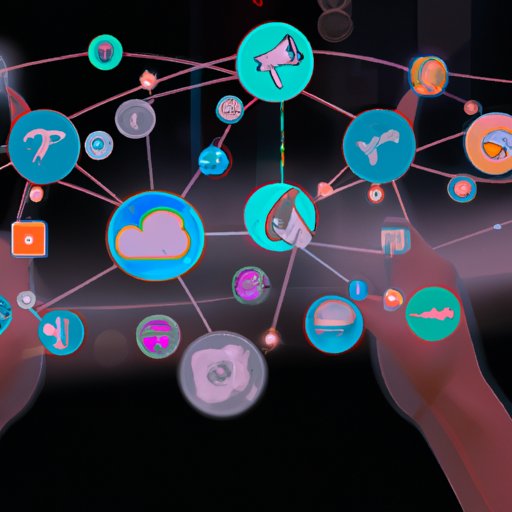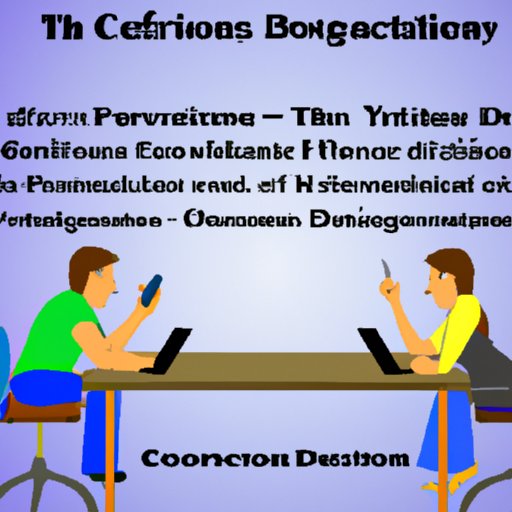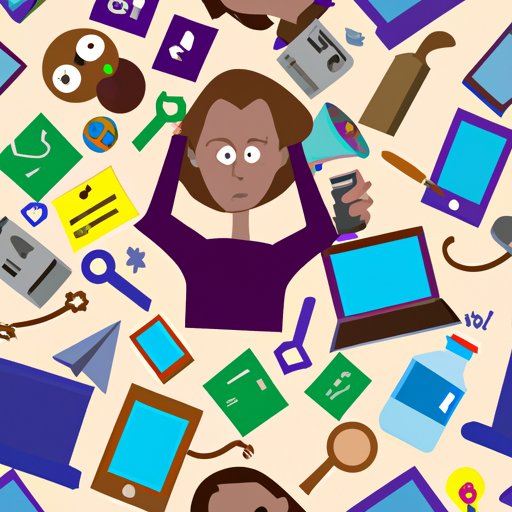Introduction
Technology has become an integral part of our lives, from smartphones and tablets to laptops and desktops. We rely on technology for work, entertainment, communication, and more. While technology can be beneficial, it can also be a major source of distraction. This article will explore the effects of technology on attention spans, cognitive performance, and productivity, as well as provide strategies for reducing technology-induced distractions.
An Exploration of the Impact of Technology on Attention Spans
Technology can have a huge impact on our attention spans. According to a study conducted by Microsoft, the average human attention span has dropped from 12 seconds in 2000 to 8 seconds in 2013, which is shorter than that of a goldfish (9 seconds). This decrease in attention span can largely be attributed to our increasing reliance on technology and the constant bombardment of information that comes with it.
Social media is one of the main culprits when it comes to reducing concentration. With notifications popping up, ads taking over our feeds, and endless content to scroll through, it’s no wonder our focus is so easily diverted. A study conducted by Harvard University found that social media use can lead to decreased attention spans and difficulty focusing on tasks.

Examining the Connection Between Technology Use and Distraction
It’s no surprise that technology can be distracting, but what is the connection between technology use and distraction? Studies have found that the mere presence of a smartphone can be enough to distract us from tasks. A 2017 study found that people who had their phones nearby while completing a task made more mistakes than those who kept their phones out of sight.
Not only does technology distract us from our tasks, but it can also cause other forms of distraction. For example, multitasking can be a major distraction. When we try to do multiple tasks at once, our brains become overloaded and we are unable to focus on any one task. Another form of distraction is procrastination, which can be caused by technology use. The constant availability of information and entertainment can make it difficult to stay focused on our tasks.
Researching the Relationship Between Technology and Cognitive Performance
In addition to being distracting, technology can also have an effect on our cognitive performance. Studies have shown that technology can affect memory and learning. For example, a study published in the journal Educational Psychology found that students who used laptop computers during lectures performed worse on tests than those who took notes by hand. Additionally, researchers from the University of California, Los Angeles, found that excessive technology use can lead to cognitive fatigue, making it harder to concentrate on tasks.
The long-term impacts of technology use are still unclear, but research suggests that frequent technology use can have negative effects on cognitive development. A study published in the journal Nature Communications found that teens who spent more than two hours per day on digital devices were more likely to experience symptoms of depression and anxiety. This suggests that technology use may have a lasting impact on mental health.
Exploring How Technology Interferes with Productivity
When we are constantly distracted by technology, our productivity suffers. Studies have found that technology can have a negative impact on work performance. A study conducted by the University of Melbourne found that employees who used their phones for personal activities during working hours were less productive and had lower job satisfaction. Additionally, a survey conducted by the University of Washington found that employees who used their phones for non-work related activities during work hours experienced higher levels of stress.
Technology can also interfere with productivity in other ways. For example, it can lead to procrastination, as previously mentioned. Additionally, technology can lead to “task-switching”, where we are constantly switching between tasks instead of focusing on one task at a time. This can lead to decreased productivity and increased stress.

Investigating the Mental Health Effects of Constant Technology Use
The effects of technology on mental health are still being studied, but research suggests that constant technology use can have a negative impact. Studies have found that technology can increase stress, anxiety, and depression. For example, a study published in the journal Computers in Human Behavior found that heavy smartphone users reported higher levels of stress than light users. Additionally, a study published in the journal Cyberpsychology, Behavior, and Social Networking found that people who used social media for more than two hours a day were more likely to experience symptoms of depression.
Furthermore, technology can lead to addiction, which can worsen mental health issues. A study published in the journal Addictive Behaviors found that people who spend too much time on their phones or playing video games can experience symptoms of addiction, such as cravings, withdrawal, and tolerance.
Strategies to Combat Technology-Induced Distractions
Fortunately, there are strategies we can use to reduce technology-induced distractions. One of the most effective strategies is to limit technology use. Set aside times when you won’t use your phone or computer, and stick to it. Additionally, turn off notifications, set boundaries around how often you check emails, and take regular breaks from technology.
There are also techniques that can help increase focus and productivity. For example, mindfulness meditation can help you stay in the present moment and let go of distractions. Additionally, setting realistic goals and breaking tasks down into smaller chunks can help you stay on track and prevent procrastination.

A Discussion of the Pros and Cons of Technology Distraction
As with any technology, there are pros and cons to technology-induced distraction. On the plus side, technology can make life easier and more efficient. It can also provide us with access to information, entertainment, and social connections. On the other hand, technology can be a major source of distraction and can have a negative impact on attention spans, cognitive performance, and productivity.
Conclusion
Technology can be a great asset, but it can also be a major source of distraction. Research has shown that technology can have a negative impact on attention spans, cognitive performance, and productivity. Additionally, it can lead to increased stress, anxiety, and depression. Fortunately, there are strategies we can use to reduce technology-induced distractions and improve focus and productivity.
(Note: Is this article not meeting your expectations? Do you have knowledge or insights to share? Unlock new opportunities and expand your reach by joining our authors team. Click Registration to join us and share your expertise with our readers.)
